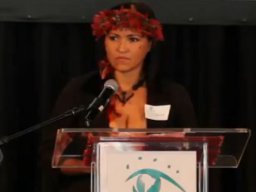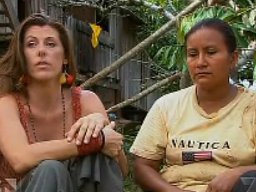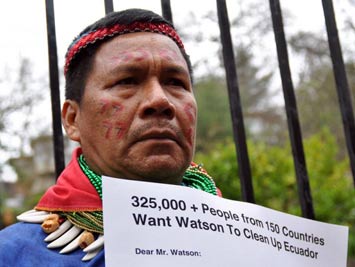The Yasuní-ITT Initiative
Covering nearly 2.5 million acres of primary tropical rainforest at the intersection of the Andes and the Amazon, Yasuní is the ancestral territory of the Huaorani people, as well as two other indigenous tribes living in voluntary isolation, the Tagaeri and the Taromenane. As a result of its unique location, Yasuní is an area of extreme biodiversity, containing what are thought to be the greatest variety of tree and insect species anywhere on the planet. In just 2.5 acres, there are as many tree species as in all of the US and Canada combined.
However, underneath the park lies some 900 million barrels of heavy crude – Ecuador's largest reserve. For a country dependent on oil for 60 percent of its exports, drilling in the ITT oil deposits (named Ishpingo, Tambococha, Tiputini respectively) has long been the desire of many past administrations. But in 2007, President Correa launched the Yasuní-ITT initiative, seeking international financial contributions equaling half of the country's forgone revenues if the government left Yasuní's oil reserve untouched. The government is seeking some $3.6 billion. The proposal seeks to strike a balance between protecting the park and its indigenous inhabitants, while still generating some revenue for Ecuador, a developing nation and net oil exporter. The plan will also keep an estimated 410 million tons of C02 – the major greenhouse gas driving climate change – from reaching the atmosphere. This precedent of avoided CO2 emissions could factor into future climate negotiations.
The landmark proposal was an uncertain three years in the making, and on several occasions appeared dead in the water. From the outset, the government insisted on a one-year deadline to raise close to $4.5 billion, which was viewed as an impossibility by potential donors and undercut the proposal's perceived viability. Political turnover led to three different Foreign Affairs ministers and three distinct negotiating teams, while the government implemented seemingly contradictory environmental policies that continued to allow drilling inside the park and expanded mining concessions throughout the Amazon. Correa's public rebuke of his negotiating team after the Copenhagen Climate Summit where the trust fund was originally set to be signed, led to the resignation of the entire team as well as the Foreign Minister and confidant, Fander Falconi.
But in August 2010, the government announced an agreement with the UN Development Program (UNDP) to finally open a much talked about international trust fund to receive donations. Initial donor countries include Germany, Spain, France, Sweden, and Switzerland, with a long list of countries said to be analyzing the initiative and considering support.
The future of the Yasuní initiative now depends on donor countries to step up and contribute, and the Correa administration to keep its word. The government hopes to receive $100 million in the next 18 months to keep the proposal alive.






